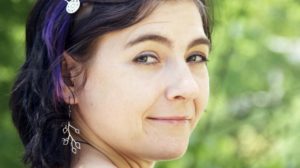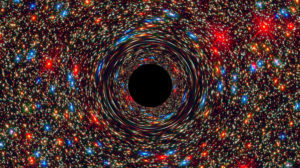“Astronomer Jillian Bellovary (The Gambia) on Black Holes, the Peace Corps and Roller Derby”
Thanks for the ‘Heads up’ about the following article from Dan Campbell (El Salvador 1974-77)
•
Astronomer Jillian Bellovary On Black Holes, The Peace Corps And RollerDerby
Written by Swapna Krishna, Syfy Wire
Women are doing amazing things in space science, and today I want you to meet Jillian Bellovary. Jillian studies black holes, and in this interview she was kind enough to talk to me about her research, her experiences as a woman in STEM, the Peace Corps, roller derby, and how knitting led her to a dream job.
Can you tell me about how you got to where you are professionally? What was your path to becoming an astronomer?
Jillian Bellovary: I’m interested in everything. I wasn’t one of those kids who always wanted to be a scientist because I have always wanted to do everything. Everything! I almost majored in Anthropology but decided the job prospects weren’t so hot. So I started out at the University of Wisconsin-Madison in Engineering, so I could be an astronaut. However, I hated engineering. Don’t get me wrong, engineers are valuable and important and fantastic … I just don’t want to be one. I like to use my imagination to figure out how things work, and when physical objects are placed in front of me I really struggle. I have a hard time with lab classes. So astronomy sounded like a great solution — figuring out the universe is really cool but I can’t study it in a lab so I’ll just think about it a lot, and I don’t have to build anything.
After college, I joined the Peace Corps in 2001 and lived in The Gambia in West Africa for two years. This is something I wanted to do ever since I heard that the Peace Corps existed, and it was fantastic. The Peace Corps slogan “The Toughest Job You’ll Ever Love” is very accurate. Those two years were very hard, fun, challenging, rewarding and shaped a lot of who I am. In particular, part of the reason I’m passionate about diversity and inclusion efforts in the sciences now is that I know what it’s like to be a minority. As a white person who lived in Africa, I know what it’s like to be judged by your appearance before you even speak. People make assumptions about where you’re from, why you’re there, how much money you have … it’s terrible. But my experience was very minimal compared to the trials that people of color face every day in the U.S.
When I returned, I applied to graduate school, because I like learning and the thought of getting a ‘real’ job was completely terrifying. I went to the University of Washington, where I learned that the kind of astronomy I like doing best is actually computational. I assumed I’d go use big telescopes and analyze my data and discover stuff in the universe; theoretical work sounded hard. But guess what, I’m much better at it and enjoy it more than observational work. I dabbled in a few different projects but wrote my thesis on how massive black holes form and evolve, which involved studying them using cosmological simulations. However, what I really did in grad school was a lot of coding and debugging.
After I got my Ph.D., I did three post-docs for a total of six years. In the past ten years, I have lived in five cities in nine apartments. This part of the career path is really hard; there’s a lot of uncertainty, and as soon as you feel comfortable somewhere you move somewhere else. Finally, I got a permanent job as an Assistant Professor at Queensborough Community College. I’m also affiliated with the American Museum of Natural History, which is absolutely the coolest place to work.
Can you speak specifically about your journey as a woman in the sciences? What obstacles have you faced? Have you had help from other women?
Every woman has a different experience, and I’ve been fortunate that I’ve never had to deal with overt sexism or harassment. There were moments where I was the only female in a classroom, but usually, when there were a few of us we would study together and form a tight community. We all have a few strategies we employ. For example, I’ve taught myself not to let men interrupt me — I just keep on talking and ignore them, or specifically tell them “Stop interrupting me.” (I’d say I do this for women, too, but women interrupting me is pretty uncommon.)
I’ve had friends and colleagues who have not been so fortunate, however. I’ve had to support friends who have dealt with some awful situations and terrible people. In these moments, women tend to band together and support each other. However, the systems in place to deal with harassed persons are often worse than useless — they make situations worse instead of better. The scientific community has been rocked by a few big scandals lately, but the ones that don’t make the news are much more numerous. And the challenges faced by women of color, women with disabilities, LGBTQ people and other people of intersectional identities are far more difficult than those faced by white able-bodied women like myself. The community still has a long way to go in eliminating the harassment of marginalized people.
How did you end up at the American Museum of Natural History? What’s it like to work there?
While discussing knitting at an astronomy conference, I met someone who worked at AMNH and she invited me to come give a talk. (Knitting can be an excellent networking tool!) Before my visit, a friend pointed me to the most tailored-to-me job ad that I had ever seen. AMNH was looking for a woman with a PhD in computational science to work with BridgeUp: STEM, a program which teaches scientific computing to high school girls. I was amazed that my interests in teaching, coding and scientific research could all overlap so much in one job. I applied and cleverly scheduled my interview for the same day that I gave my talk.
Working at AMNH is unbelievable. For example, the other day I was asked, “Can someone help me tattoo some dead cornish game hens before I mummify them?” Really! The only normal response to that question is “WHAT?!” Stuff like that happens all the time; it stops being weird after a while. Between the scientific research, the educational programs and the other events going on at AMNH, it is definitely the least boring place to work in the world. When I’m having a rough time with some code or some writing, I can take a break and go look at some fossils or textiles or gems or ancient statues and get a little perspective. I’ve learned so much about the natural world, too. Ask me about mitochondrial DNA replication; I just went to two talks on it.
Talk to me a little about your research on black holes.
Black holes are so cool! We know that ‘small’ black holes form when massive stars die, but we have no idea how supermassive black holes form (though we are pretty sure they are not built from millions of small black holes). We don’t know if intermediate mass black holes even exist, but it kind of makes sense that there could be something in the middle, between the small and the enormous. They’re really hard to find and so my research has focused on trying to think of new ways to form them and observe them. I make predictions and then I go tell the astronomers with the telescopes what to look for. Sometimes I’m even right!
The idea of smaller black holes merging together in the accretion disks of supermassive black holes helps explain our recent detections of gravitational waves. We’ve detected gravitational waves from merging black holes (AMAZING!) and the black holes were bigger than we thought they would be. In fact, they are so big that our theories of how black holes form aren’t quite good enough to explain why they exist! I’ve been working on trying to get small black holes to grow and merge together in efficient ways so they can get big enough to explain the LIGO events, and maybe even bigger enough to become “intermediate mass.” We have a long way to go before we know how everything fits together, but I want to take this theory as far as I can because it is so off-the-wall and neat. I’ve never been one to go with the status quo; I like the weird ideas.
Do you have any advice for young women — or even women who are looking at a second career — about becoming an astronomer?
Studying astronomy is really fulfilling because if you have questions about the world, the universe, why we are here — you can look for answers! However, every answer you find results in about five more questions. It never ends.
Being trained as an astronomer involves lots of different skills — computer programming, statistics, math, writing, public speaking and lots of critical thinking. Every astronomer is definitely very marketable in many different career fields and so there are many options for someone with an astronomy background. You don’t have to do astronomy forever. But I don’t recommend a Ph.D. to someone unless they really really want it. Grad school is hard — not just mentally but also emotionally. You only put yourself through a Ph.D. program if you love what you’re doing.
My general advice on life is that you have to follow your heart. If you have always wanted to do a thing (join the Peace Corps, hike the Appalachian Trail, backpack through Europe, start a business, write a novel, whatever), you have to do it. Take the time to make sure your heart is fulfilled. Make sure you’re making space in your life for the thing that keeps you happy and sane. Trust your heart and let it guide you.
Right now that thing for me is the sport of roller derby. I play for the Gotham Girls All Star team, which is one of the best in the world (yes we do have world rankings). This means that I train with my team for around nine hours a week, spend a few more hours at the gym and spend a lot of time bruised and fatigued. However, this sport brings me so much joy that I can’t imagine my life without it. I do this on top of my full-time job as a professor, because if I don’t do it I go crazy. When I’m frustrated with work, with people, with whatever, those hours when I have skates on my feet are hours when I am not dwelling on those frustrations. I’m with my teammates, who are powerful awesome women from all different backgrounds, and together we release our stress and express ourselves by smashing into each other. The combination of athleticism and community makes roller derby really unique, and I can’t live without it. This is where my heart tells me to be.
•
You can find Jillian on Twitter at @j_bellovary and more about her research at her website.


No comments yet.
Add your comment